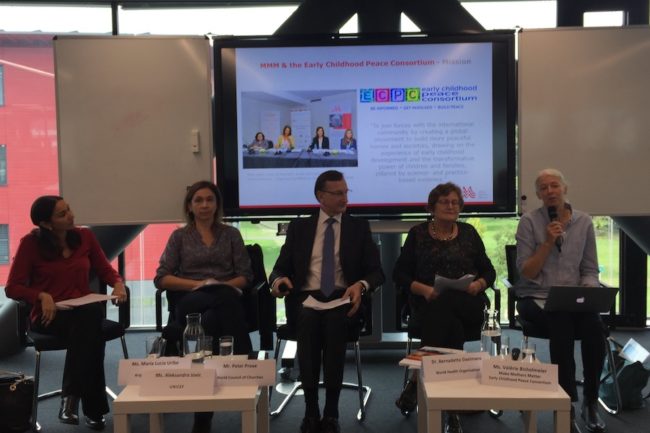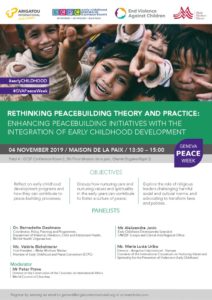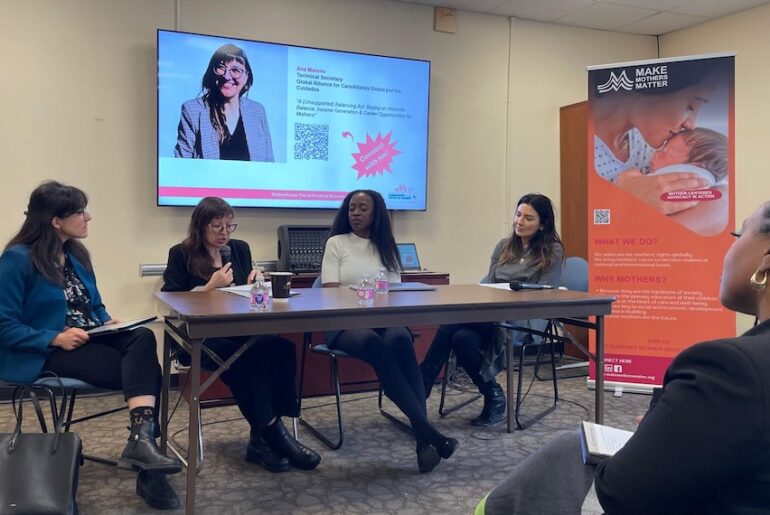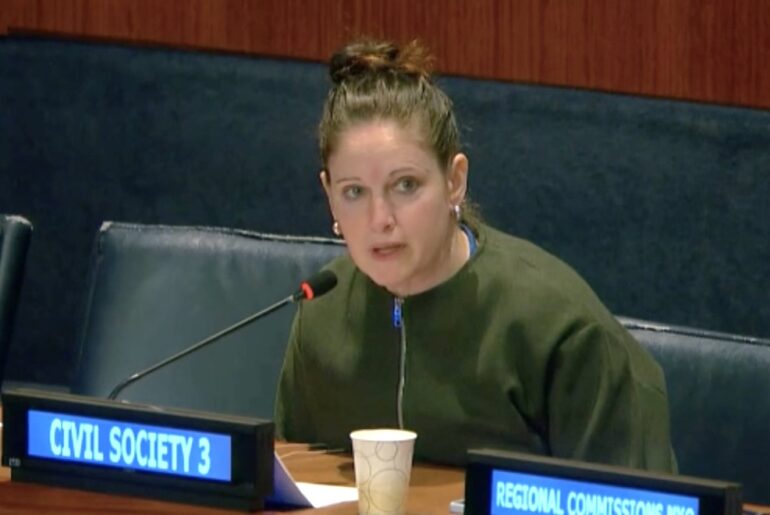Supporting mothers and families essential for Early Childhood Development and Peace
05.11.19
UN Geneva, Geneva Peace Week - MMM had the privilege to represent the Early Childhood Peace Consortium at an event organized by Arigatou International on "Rethinking Peace theory and practice: enhancing peacebuilding initiatives with the integration of early childhood development".

 The panel event, which took place in the context of the Geneva Peace Week 2019, brought together diverse experts on Early Childhood Development:
The panel event, which took place in the context of the Geneva Peace Week 2019, brought together diverse experts on Early Childhood Development:
- Aleksandra Jovic, ECD expert from UNICEF, presented the latest research on Early Childhood Development and how UNICEF integrates this Science into its programs; she also highlighted the high costs of inaction vs. the potential of high returns on investing in ECD
- Bernadette Daelmams, coordinator, Policy, Planning and Programs at the Maternal, newborn child and adolescent health department of the World Health Organisation presented the Nurturing Care Framework that WHO launched in 2018 to support ECD
- Maria Lucia Uribe, Director of Arigatou International Geneva and convener of the International Consortium on nurturing values and spirituality for the prevention of violence in Early Childhood, brought the spiritual dimension into the discussion, highlighting the importance of how a child relates to himself and develops a sense of belonging.
Introducing the Early Childhood Peace Consortium (ECPC)
In her intervention, MMM Vice-President Valerie Bichelmeier presented the background to the ECPC, its mission and its different areas of work, and how MMM became involved in its work.
The Mother and Child Program (MOCEP) devised by ACEV, one of the ECPC’s founding partners, provided a concrete example of how empowering mothers with Child Development knowledge and parenting skills could change relationships within families and help reduce violence. MOCEP was implemented and evaluated in Palestinian refugee camps in Lebanon, a very fragile context where violence is rampant.
Empowering families, parents and children for peace
The second part of the presentation focused on the importance of working with and supporting mothers and families – to empower parents and children as agents of peace.
“It is within the family unit that the values and beliefs that shape an individual are transmitted; that a child first experiences safety or distress, nurturing or violent relationships, as well as the joys and challenges of living with others; And it is also within the family that a child learns tolerance – or intolerance, as well as the peaceful – or violent – resolution of conflicts”, Valerie Bichelmeier insisted.
The Science is clear that enabling children to grow up in healthy, violence-free and nurturing families is essential for them to reach their full potential and to find their role in society – which ultimately is the foundation for lasting peace.
Most parents want the best for their children, but the reality is that they face many challenges – especially mothers:
- Violence: both direct violence like domestic violence or violence in areas affected by war or conflict, and indirect violence like poverty, displacement, homelessness, etc. Violence clearly affects a mother’s ability to properly care for her children – and leads to a pattern of intergenerational transmission of violence.
- Time: mothers are increasingly present in the workforce and face the challenge of balancing paid work with their domestic and caring responsibilities – with the knowledge that globally, women still carry the bulk of unpaid family care work, including domestic tasks and the work of caring for children and other dependent family members.
- Mental health problems: according to WHO mental health problems, including depression and anxiety, affect 10 to 20% of mothers during pregnancy and the year after childbirth. This obviously impacts their ability to provide adequate nurturing and responsive care
- Isolation: families/mothers are increasingly isolated, often living far away from grandparents and the extended family that traditionally helped with raising children
- Single motherhood is a reality for an increasing number of mothers – and in the majority of cases, it is not a choice.
All these issues also need to be addressed as part of any policy that aims at supporting ECD. They show that ECD touches many sectors, including health, education, social affairs, labour, family affairs, women’s rights and gender equality. This means that the answer should also be multi-sectorial.
Mothers are key players and they must be recognised as such. They should be informed and educated on early childhood development, on positive parenting and nurturing relationships, and on the importance of providing responsive and loving care. And they should be supported in this challenging but essential job.
Let us be careful however not to put too much pressure on mothers with the many challenges they face already… we must recognise that women also have other roles to play in society: as citizens, professionals, politicians and community leaders.
It is also absolutely essential that fathers are involved – a quadruple win: for the mother, for the child, for the father himself, and ultimately, for society as a whole – and peace.
See also:
- The Early Childhood Peace Consortium website
- MMM International Conference #Mothers4Peace where Rima Salah, Chair of the ECPC, made a powerful intervention on “Pathways to Peace: The Transformative Role of Mothers in Building Peace at Home”
- MMM advocacy to support Early Childhood Development as a pathway to sustainable development and peace
Time Poverty and the Motherhood Penalty
Unveiling Economic and Social Injustices
09.07.24
Mothers play an essential role in families by ensuring their loved ones are nourished, educated, and healthy, but their unpaid care work often leads to economic and social injustices, known
Envisioning care as a common thread to global crises
29.07.24
UN New York - Our virtual HLPF side-event brought together experts to shed light on how the various global crises we face (in particular climate change and other environmental crises,
We call for multi-stakeholder approach to recognise and support unpaid care work
21.07.24
UN New York - Participating in the meeting of the UN Economic and Social Council (ECOSOC) on care and support systems, MMM reaffirmed the principle of co-responsibility, which should underpin








